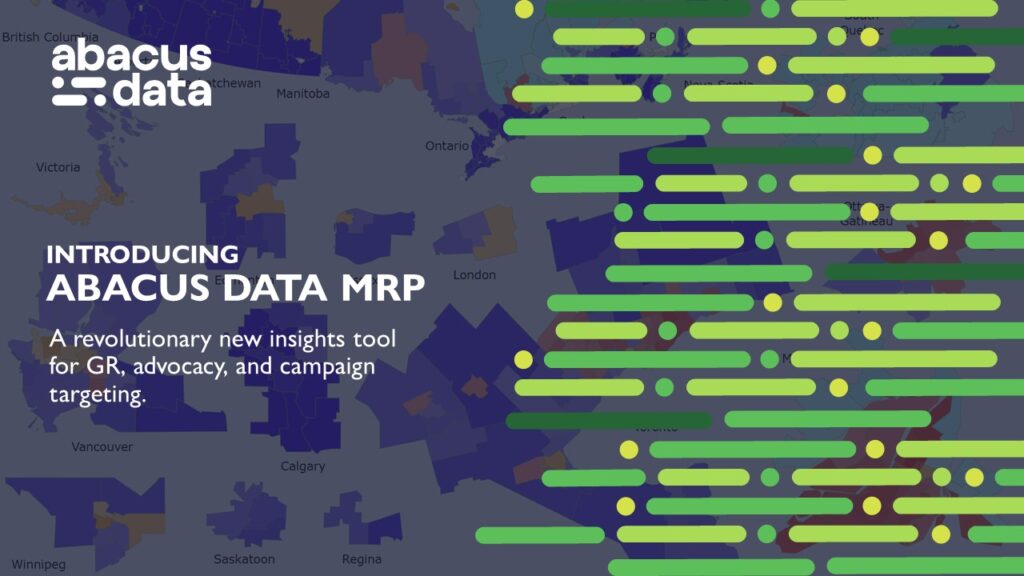Abacus Data Poll: Liberals lead by 6
At about the halfway point of the campaign, a new poll conducted entirely after Trump’s announcement of reciprocal tariffs last week finds the Liberals opening up a six point lead over the Conservatives. The survey of 1,900 Canadian adults was conducted from April 3 to 8, 2025.
For the first time in the campaign, we find the Liberals opening up a statistically significant lead nationally over the Conservatives. If an election were held at the time of the survey, the Liberals would get 42% compared with 36% for the Conservatives and 11% for the NDP. Since our last survey, the Liberals are up 3 while the Conservatives are down 3.

The Liberal lead holds even among those most certain to vote. Among likely voters, we have the Liberals at 43% and the Conservatives at 37%. The NDP is at 10%.

Regionally, the Liberals lead by 10 in Ontario, by 37 in Atlantic Canada, and by 19 in Quebec. In B.C., the Conservatives are ahead by 7, while in Alberta, the Conservatives lead by 29.


The Liberals are now ahead or tied with the Conservatives across all age groups. They lead by 7 among 18 to 29 year olds, by 4 among 30 to 44 year olds, are tied among those aged 45 to 59, and lead by 14 among those over 60.
They have also opened up a 17-point lead among those with a university degree, are ahead by 3 among college graduates, and trail by 3 among those with lower levels of formal education.


The Composition of the Liberal Coalition
When we look at who makes up the current Liberal coalition, based on their past voting behaviour, 61% of the current coalition voted Liberal in 2021, 20% didn’t vote in 2021, 8% voted NDP, and 7% voted Conservative.
This reinforces the fact that the Liberals have largely reconstituted the group who voted for them in 2021 and built on it by attracting almost equally from the Conservatives and the NDP.

Almost Half of Canadians Now Think the Liberals Will Win the Election
Today, 47% of Canadians think the Liberals will win the election, up 4 points from last week and up 15 since mid-March. 30% think the Conservatives will win and only 5% think the NDP will.

When we dig a bit deeper and ask whether the outcome will be close or not, we find that 46% think the Liberals will win and 31% think it will be close. Another 23% think the Conservatives will win with only 7% thinking the Conservatives will win by a lot. 17% think it’s a 50/50 coin flip while 15% are unsure how to describe the election.

Leader Favourability and Perceptions
Mark Carney’s net favourability hits +19 (47% positive, 28% negative), up five points from last week. While still divisive, Pierre Poilievre’s net score is not overly negative, but still no where near where Carney is today at -6 (38% positive, 44% negative).


On preferred Prime Minister, Carney now leads by seven points (41% vs. 34%). Carney is preferred as Prime Minister by 17 in Atlantic Canada, by 20 in Quebec, by 8 in Ontario, and by 6 in British Columbia.


The Upshot: Liberals now clearly favoured
Our newest polling—conducted after Donald Trump’s reciprocal tariff announcement and the removal of the carbon price in provinces where the federal backstop was in place—shows the Liberals surging ahead with a six-point lead over the Conservatives. If the election were held today, the Liberals would capture 42% of the vote against 36% for the Conservatives, with the NDP at 11%. Not only have the Liberals gained three points over the past week (while the Conservatives shed three), but that advantage extends among likely voters, widening slightly to 43% versus 37%. Regionally, the Liberals now lead in Ontario, Atlantic Canada, and Quebec by solid margins, while the Conservatives retain control in Alberta and carry a more modest edge in British Columbia. The Liberals are also either leading or running even among every age group, suggesting a broader demographic coalition behind Mark Carney.
Beyond vote intention, public perception appears to favour the Liberals. Nearly half of Canadians now predict a Liberal win—a 15-point jump since mid-March—and Carney’s net favourability has climbed to +19, positioning him well against Pierre Poilievre’s net -6. Carney’s lead on the “preferred Prime Minister” measure has grown to seven points, buttressed by double-digit advantages in Atlantic Canada and Quebec, and a comfortable edge in Ontario. Demographically, the Liberals have solid support from university graduates (a 17-point lead) while still being competitive among college graduates and those who previously supported other parties. Notably, 61% of current Liberal supporters backed the party in 2021, but the party has also attracted both former NDP and Conservative voters, plus a slice of those who sat out the last election altogether.
This broader Liberal base, set against a somewhat diminished but still energized Conservative core, has shifted the momentum considerably. Conservative partisans remain committed, yet the continued attention to trade uncertainty and the economic impact of Trump’s tariffs appears to have played into the Liberals’ hands, reinforcing Carney’s image as a steady manager in turbulent times. With nearly two weeks left, Poilievre may still recapture cost-of-living concerns and an appetite for change if Trump’s trade tensions recede from daily headlines. But for now, the Liberals have the upper hand. Should these trends hold, Carney’s issue ownership, his lead among Boomers, and rising personal favourability may well become defining factors—setting the stage for a decisive outcome in this pivotal 2025 election.

Methodology
The survey was conducted with 1,900 adult Canadians over the age of 18 from April 3 to 8, 2025. A random sample of panelists were invited to complete the survey from a set of partner panels based on the Lucid exchange platform. These partners are typically double opt-in survey panels, blended to manage out potential skews in the data from a single source.
The margin of error for a comparable probability-based random sample of the same size is +/- 2.1%, 19 times out of 20.
The data were weighted according to census data to ensure that the sample matched Canada’s population according to age, gender, educational attainment, and region. Totals may not add up to 100 due to rounding.
This survey was paid for by Abacus Data Inc.
Abacus Data follows the CRIC Public Opinion Research Standards and Disclosure Requirements that can be found here: https://canadianresearchinsightscouncil.ca/standards/

ABOUT ABACUS DATA
We are Canada’s most sought-after, influential, and impactful polling and market research firm. We are hired by many of North America’s most respected and influential brands and organizations.
We use the latest technology, sound science, and deep experience to generate top-flight research-based advice to our clients. We offer global research capacity with a strong focus on customer service, attention to detail, and exceptional value.
And we are growing throughout all parts of Canada and the United States and have capacity for new clients who want high quality research insights with enlightened hospitality.
Our record speaks for itself: we were one of the most accurate pollsters conducting research during the 2021 Canadian election following up on our outstanding record in the 2019, 2015, and 2011 federal elections.
Contact us with any questions.
Find out more about how we can help your organization by downloading our corporate profile and service offering.






































































